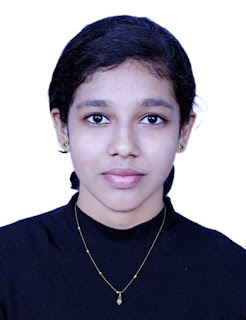She hopes, I exist
Diya Geomin
is a grade 12 student of Carmel Public School, Vazhakulam, Kerala, India. She
wrote the following poem about a close friend of hers who is struggling with
depression. Notice how the problems of the other
person intertwine with those of the poet persona.
She hopes, I exist
By Diya Geomin
She hopes to see the better world
She hopes to know her true self
That nobody, even herself,
knows
She hopes to find a new
fantasy
To escape some time alone.
She hopes to hide under the stairs
To cry out her pain somewhere no
one cares
She hopes to escape into her books.
With the pennies she doesn't have.
She hopes to run away to an unknown
place.
Full of surprises, waiting to be
startled.
Waiting to be claimed, owned and
used
Be with every lover her books could
offer.
Yet to her dismay, she finds none.
It's only herself, all alone
Hoping for some twisted ways to
escape
Hanging by a thread waiting to be
dropped.
Just like me, she dreams
Dreams left unfulfilled
Only to haunt her soul
forever
Oh, how ironic that you hope,
Unlike me, who let the shadows
consume my mind.
You hope and hope until there is
nothing left
You believe in destiny, not yet
proven.
You go with the flow and be
exhausted.
Unlike me who's covered in the
black ink
Hope is dangerous, it kills you
from within.
Until all there is left are our
tears
The tears of betrayal.
So, my love, I'm helpless like that
Waiting to be devoured by the
darkness within.
So, while you do, please hope for
me too.
xZx


Wow
ReplyDeleteSome of the readers of her poetry would in actuality find this poem to be their own saga, experiencing excruciating pain and hopelessness. For others, it could be self- discovery with eluding solutions.
ReplyDeleteOverall, an excellent poem from an young sojourner.
Thank you so much. It is indeed a perspective of a person who hoped too much but got nothing in return. But they still continue to encourage others to hope even though they got nothing from it.
DeleteVery intense. Maybe she should speak to me.
ReplyDeleteThank you so much for your appreciative words.
DeletePowerful words...
ReplyDeleteBeautifully crafted words! It's difficult to find such friends today. The lines are deeply melancholic and reassuring.
ReplyDeleteI love the last line - I'm helpless like that, Waiting to be devoured by the darkness within - it has as deep sense of sadness to it, a sense of reality about hopelessness and wonder. Very moving..
ReplyDeleteThank you. That was intentional
DeleteMoving poem.
ReplyDeleteThis poem reminds me of a thought that was written on the bulletin board of our classroom in Sawan. It said- " Never lose hope. Hope is a rope that swings you through life". Being from a Gurjar ethnicity, it was not easy to have a warm rapport with my teachers. So once my mathematics teacher read that thought and told me very sarcastically-"Beta! Tum bhi HOPE karte rahna, ek din zaroor maths mein pass ho jaoge".And guess what? I failed over and over again😊. Somethings never change, you see. Nostalgia strikes!
ReplyDeleteYours Last bencher:)
A lot of things could be different if we talked personally with people concerned. For example, if you had developed some sort of a rapport with that teacher, the entire situation would have been a lot different.
DeleteYet, I'm happy you're able to smile over these things now. All the best. I wish I could talk to you personally.
This poem is about two people who are similar in character except for their perspective of hope. One of them is very hopeful while the other hoped too much and got nothing in return even though she encourage the other two hope. Because, could it be just her or is everyone unlucky in life?...
DeleteIf you start establishing contacts with people, you'll realise how sad most lives are!
DeleteMelancholic and intense.
ReplyDeleteThe poem tugs at your heart strings.
ReplyDelete